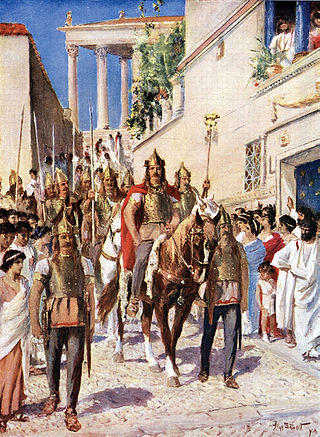
Alaric I was the first king of the Visigoths, from 395 to 410. He rose to leadership of the Goths who came to occupy Moesia—territory acquired a couple of decades earlier by a combined force of Goths and Alans after the Battle of Adrianople.
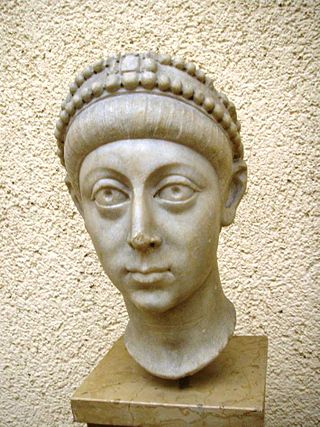
Arcadius was Roman emperor from 383 to his death in 408. He was the eldest son of the Augustus Theodosius I and his first wife Aelia Flaccilla, and the brother of Honorius. Arcadius ruled the eastern half of the empire from 395, when their father died, while Honorius ruled the west. A weak ruler, his reign was dominated by a series of powerful ministers and by his wife, Aelia Eudoxia.

Honorius was Roman emperor from 393 to 423. He was the younger son of emperor Theodosius I and his first wife Aelia Flaccilla. After the death of Theodosius in 395, Honorius, under the regency of Stilicho, ruled the western half of the empire while his brother Arcadius ruled the eastern half. His reign over the Western Roman Empire was notably precarious and chaotic. In 410, Rome was sacked for the first time in almost 800 years.
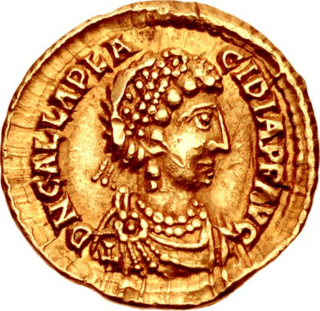
Galla Placidia, daughter of the Roman emperor Theodosius I, was a mother, tutor, and advisor to emperor Valentinian III. She was queen consort to Ataulf, king of the Visigoths from 414 until his death in 415, briefly empress consort to Constantius III in 421, and managed the government administration as a regent during the early reign of Valentinian III until her death.
The 400s decade ran from January 1, 400, to December 31, 409.

Year 408 (CDVIII) was a leap year starting on Wednesday of the Julian calendar. At the time, it was known as the Year of the Consulship of Bassus and Philippus. The denomination 408 for this year has been used since the early medieval period, when the Anno Domini calendar era became the prevalent method in Europe for naming years.

Year 398 (CCCXCVIII) was a common year starting on Friday of the Julian calendar, the 395th Year of the Common Era (CE) and Anno Domini (AD) designations, the 398th year of the 1st millennium, the last 3 years of the 4th century, and the 9th and pre-final year of the 390s decade. At the time, it was known as the Year of the Consulship of Augustus and Eutychianus. The denomination 398 for this year has been used since the early medieval period, when the Anno Domini calendar era became the prevalent method in Europe for naming years.
The 390s decade ran from January 1, 390 to December 31, 399

Stilicho was a military commander in the Roman army who, for a time, became the most powerful man in the Western Roman Empire. He was of Vandal origins and married to Serena, the niece of emperor Theodosius I. He became guardian for the underage Honorius. After nine years of struggle against barbarian and Roman enemies, political and military disasters finally allowed his enemies in the court of Honorius to remove him from power. His fall culminated in his arrest and execution in 408.
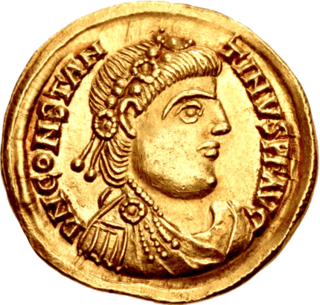
Constantine III was a common Roman soldier who was declared emperor in Roman Britain in 407 and established himself in Gaul. He was recognised as co-emperor of the Roman Empire from 409 until 411.

Constans II was the son of Western Roman emperor Constantine III, and served as his co-emperor from 409 to 411. Constans was a monk prior to his father being acclaimed emperor by the army in Britain in early 407, an act of rebellion against the ruling emperor Honorius. He was summoned to Gaul, appointed to the position of caesar (heir) and swiftly married so that a dynasty could be founded. In Hispania, Honorius's relatives rose in 408 and expelled Constantine's administration. An army under the generals Constans and Gerontius was sent to deal with this and Constantine's authority was re-established. Honorius acknowledged Constantine as co-emperor in early 409 and Constantine immediately raised Constans to the position of augustus (emperor), theoretically equal in rank to Honorius as well as to Constantine. Later in 409 Gerontius rebelled, proclaimed his client Maximus emperor and incited barbarian groups in Gaul to rise up. Constans was sent to quash the revolt, but was defeated and withdrew to Arles. In 410, Constans was sent to Hispania again. Gerontius had strengthened his army with barbarians and defeated Constans; the latter withdrew north and was defeated again and killed at Vienne early in 411. Gerontius then besieged Constantine in Arles and killed him.
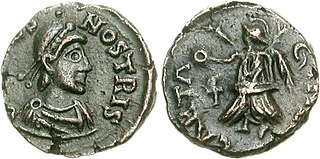
Bonifatius was a Roman general and governor of the diocese of Africa. He campaigned against the Visigoths in Gaul and the Vandals in North Africa. An ally of Galla Placidia, mother and advisor of Valentinian III, Bonifacius engaged in Roman civil wars on her behalf against the generals Felix in 427-429 and Aetius in 432. Although he defeated the latter at the Battle of Rimini, Bonifacius suffered a fatal wound and was succeeded by his son-in-law Sebastianus as patricius of the Western Roman Empire.
The Battle of Pollentia was fought on 6 April 402 (Easter) between the Romans under Stilicho and the Visigoths under Alaric I, during the first Gothic invasion of Italy (401–403). The Romans were victorious, and forced Alaric to retreat, though he rallied to fight again in the next year in the Battle of Verona, where he was again defeated. After this, Alaric retreated from Italy, leaving the province in peace until his second invasion in 409, after Stilicho's death.

The sack of Rome on 24 August 410 AD was undertaken by the Visigoths led by their king, Alaric. At that time, Rome was no longer the capital of the Western Roman Empire, having been replaced in that position first by Mediolanum in 286 and then by Ravenna in 402. Nevertheless, the city of Rome retained a paramount position as "the eternal city" and a spiritual center of the Empire. This was the first time in almost 800 years that Rome had fallen to a foreign enemy, and the sack was a major shock to contemporaries, friends and foes of the Empire alike.
Gildo was a Roman Berber general in the province of Mauretania Caesariensis. He revolted against Honorius and the Western Roman Empire, but was defeated and possibly killed himself or was assassinated.
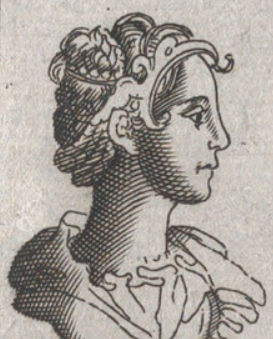
Aemilia Materna Thermantia was a Roman empress as the second wife of the Western Roman Emperor Honorius.
Heraclianus was a provincial governor and a usurper of the Western Roman Empire (412–413) opposed to Emperor Honorius, who had originally brought him to power. Heraclianus helped put down a rebellion by Priscus Attalus. However, he decided to stage his own rebellion and during his invasion of the Italian peninsula, was either defeated in battle or captured and executed.
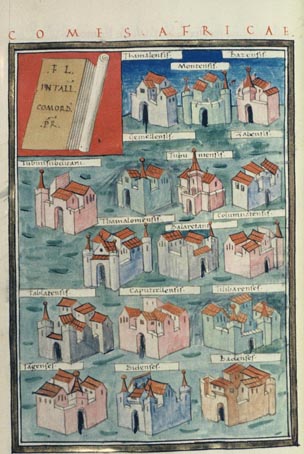
The comes Africae was in the Late Roman Empire, the commander of the troops comitatenses and limitanei in the diocese of Africa. His direct superiors were, in times of the Notitia dignitatum, about 400, the magister peditum for the units of infantry and the magister equitum for those of cavalry. He also supervised the performance of the dux limitis Mauretaniae Caesariensis and the dux provinciae Tripolitanae.
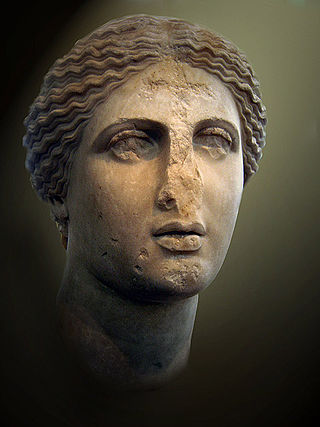
The anti-paganism policies of the early Byzantine Empire ranged from 395 till 567. Anti-paganism laws were enacted by the Byzantine Emperors Arcadius, Honorius, Theodosius II, Marcian and Leo I the Thracian. They reiterated previous legal bans, especially on pagan religious rites and sacrifices and increased the penalties for their practice. The pagan religions had still many followers but they were increasingly obliged to keep under cover to formally comply with the edicts. Significant support for paganism was present among Roman nobles, senators, magistrates, imperial palace officers, and other officials.

Eucherius was the son of Stilicho, the magister militum of the Western Roman Empire, and Serena, a Roman noblewoman who was the niece of Eastern Roman Emperor Theodosius I. He was born in c. 388 in Rome, Italy. Despite being the son of the magister militum, Eucherius did not rise farther than the modest rank of tribune of the notaries. Stilicho was accused by his political opponents of plotting to install Eucherius as a third emperor in Illyricum, and as a result of this Stilicho was arrested and executed on 22 August 408, and Eucherius soon after.